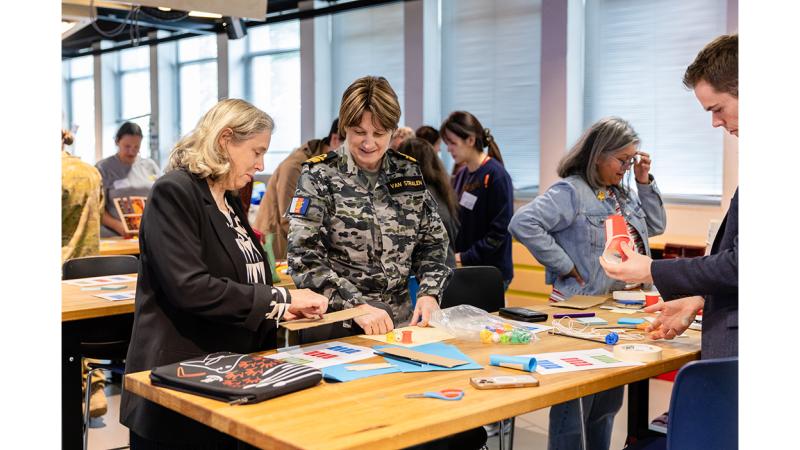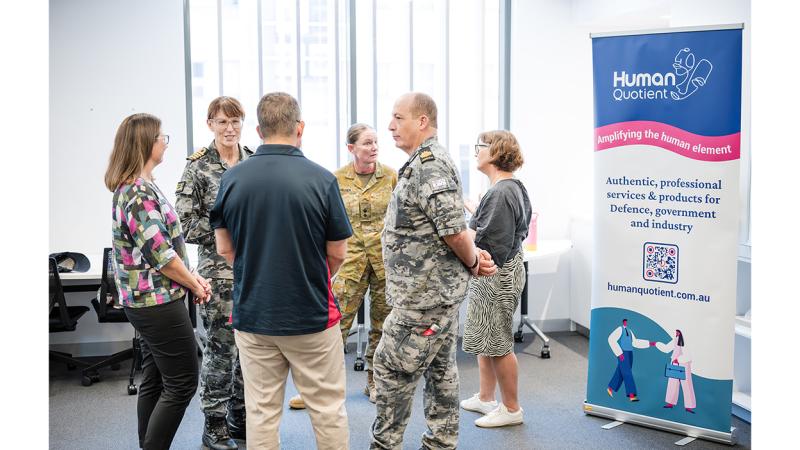19 August 2024
For 27 years Army has been making connections, sharing skills and engaging in cultural intelligence exchanges with Indigenous communities across Australia.
In Pitjantjatjara, the first language of the people of Aṉangu in Amata, an Aṉangu Pitjantjatjara Yankunytjatjara Lands community in the north-west corner of South Australia, the practice of two-way sharing is called Ngapartji Ngapartji.
Captain Debra Johnson said members of the 2024 Army Aboriginal Community Assistance Program (AACAP) felt privileged to be involved in Ngapartji Ngapartji with the men and women in Amata.
“Last year I travelled to Amata to meet with the elders, community representatives and key community stakeholders to discuss what training we could deliver under AACAP 2024,” Captain Johnson said.
“We sat down and discussed what educational opportunities there were, what units of competency could be achieved and what those units could add up to.
“When I deployed as the AACAP 2024 training development officer in May, I came in with a shell concept of what could be achieved, however, the ideas evolved and Ngapartji Ngapartji was a big part of it.”
With the community keen to support opportunities for employment pathways and one of the closest employers being a holiday resort for tourists to the Red Centre, Captain Johnson organised for a commercial espresso coffee machine to be installed at the local TAFE facility by tradespeople from 6th Engineer Support Regiment.
“We purchased a coffee machine suitable for the dry environment here and TAFE South Australia purchased a reverse osmosis filter to prolong the longevity of the coffee machine,” Captain Johnson said.
“TAFE sourced an instructor who could teach community members hygienic practices for safe food handling and how to serve espresso coffee, while the AACAP contingent hosted the instructor at Camp Birt so they had somewhere to stay while they were here.
“It’s been a real collaborative effort.”
Four members of the Amata community were awarded the two units of competency just in time for the Amata Career Expo, where they put their newly acquired coffee-making skills to good use.
“TAFE sourced an instructor who could teach community members hygienic practices for safe food handling and how to serve espresso coffee, while the AACAP contingent hosted the instructor at Camp Birt so they had somewhere to stay while they were here."
In addition, six community members, including two local NORFORCE (North-West Mobile Force) members, did a two-day White Card course to enable them to work in the construction industry.
“A White Card is one of the essential elements that the employees at the local CDP needed to open up additional employment pathways,” Captain Johnson said, referring to the local Community Development Program (CDP), a remote employment and community development program administered by the National Indigenous Australians Agency.
“All of the training we’ve helped co-ordinate with the local TAFE has been delivered as a result of collaboration between the AACAP contingent, TAFE SA and the CDP,” she said.
At the CDP workshop, members of the AACAP training team delivered on-the-job training and mentoring in basic welding and carpentry to help Amata community members restore furniture and reclaim materials for projects, such as barbecues and seating.
Meanwhile, in the CDP kitchen, Amata resident Judith Walker said the women learnt how to cook a wider range of meals they could prepare in bulk and freeze.
“Normally they would eat the same meal every day, like sandwiches, pasta or spaghetti bolognaise; just easy stuff,” Ms Walker said
“Now we have better time management and do the bulk of the cooking on a Monday.
“We’ve also changed the rules now that we’ve done a safe food handling course with TAFE.
“We no longer let the men come in and make their own meals in the kitchen because they come in like a twister, making a mess everywhere after we’ve just cleaned up.”
Roslyn Mervin, CDP’s administration clerk, said the women now had more time to spend on other projects at the CDP.
“I have more time for painting and I’ve been able to learn sewing from Debra [Captain Johnson] instead of being in the kitchen all day, cleaning up and going back home and doing it again for my family,” Ms Mervin said.
Putting her new sewing skills to the test, Ms Mervin made a paper pattern off her granddaughter’s jumper and sewed a larger jumper that could be worn over the top of the other jumper for extra warmth.
Captain Johnson also taught the CDP women how to machine sew a rope basket, and in the spirt of Ngapartji Ngapartji, the women showed members of the AACAP contingent how to hand-weave baskets with braided raffia.
“I tried to sew a basket and couldn’t do it properly, so I had to sing out to Debra to come help me,” Ms Walker said.
“The biggest challenge with learning sewing is remember to take your foot off the pedal.”


